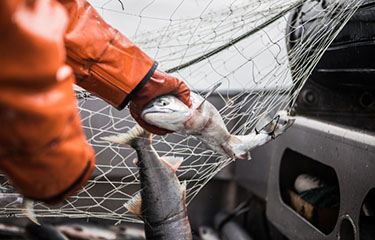Global warming has swollen salmon runs in Bristol Bay, Alaska, U.S.A., with record-breaking harvests in recent years.
Bristol Bay’s salmon runs will likely remain robust as Alaskan waters get hotter, according to University of Washington School of Aquatic and Fishery Sciences Professor Daniel Schindler.
“Unlike most stories about climate change that we hear across the world, Bristol Bay has actually benefited from climate warming so far,” said Schindler, who helps lead the university’s Alaska Salmon Program, in a presentation at the Bristol Bay Sustainability Summit, held 23 and 24 March in Dillingham, Alaska. “Bristol Bay watersheds probably still have a lot of potential warming that will increase salmon productivity that we should expect to see in the next few decades.”
The Bristol Bay region’s relatively short rivers and ecosystem diversity allow sockeye salmon a range of water temperatures and habitats, giving them an advantage in responding to changing climatic conditions, he said. Additionally, Schindler said warming of nearshore temperatures enhances the ability of juvenile salmon to survive in the ocean, according to Alaska Fish News.
“I’m quite optimistic that there’s at least 100, maybe 200 years of warming left in the Bristol Bay systems before we have a lot of problems with migrating fish,” Schindler said.
In 2023, the Alaska Department of Fish and Game (ADFG) is forecasting a run of 51 million sockeye in the Bristol Bay watershed, projected to be among the top five strongest returns in the last 20 years, and 40 percent greater than the average annual run recorded since 1963.
However, Schindler was pessimistic about the future of salmon runs in Alaska rivers that don’t provide natural advantages for sockeye and other salmon, especially for long, big rivers like the Yukon, Kuskokwim, Fraser, and Columbia.
“Fish [there] are already suffering from warm temperatures. I would argue that things do not look particularly promising for rivers like the Yukon,” he said.
On 29 March, ADFG announced it does not expect to open any commercial gillnet fishing in two districts of Kuskokwim Bay. Many of the salmon fisheries in the bay have been closed since 2016 due to low returns and the lack of a commercial buyer, according to KYUK. In recent years, the U.S. government has issued disaster declarations for numerous Alaska salmon fisheries, including the Upper Cook Inlet, Prince William Sound, Copper River, Norton Sound, Yukon River, Chignik, Kuskokwim, and Southeast Alaska.
Across all of Alaska’s salmon fisheries, habitat protection – especially of lake and river systems – will be key to preserving salmon populations, Schindler said.
A pair of recently filed lawsuits is seeking to preserve protections for the Yukon and Kuskokwim. A suit filed 30 November, 2022, on behalf of Juneau, Alaska resident Eric Forrer, claims declining salmon returns in the Kuskokwim and Yukon rivers “illustrate a failure to adhere to the constitutional directive regarding sustained yield.”
The suit argues the state government is managing those fisheries so poorly it is violating the Alaska Constitution, according to the Alaska Beacon.
Separately, in a suit filed 6 April, 2023, three Yukon-Kuskokwim Delta tribes have called on the U.S. Army Corps of Engineers to overturn its final environmental impact statement approving the Donlin Gold Mine, planned for Mamterilleq, Alaska. The suit, filed in conjunction with environmental non-governmental organization EarthJustice, asks federal agencies involved in approving the mine to commit to further study of the impact the mine might have on downstream waters and villages from a potentially catastrophic tailings dam failure. It also asks for a study of how the mine might impact populations of rainbow smelt, a key prey species for salmon.
“Our Mother Kuskokwim Tribal Coalition is committed to defending our way of life – which means fighting the placement of the largest open mine in the world along our river,” Mother Kuskokwim Coalition Co-Founder Beverly Hoffman said in a press release. “Too often, human error in large extraction projects causes irreversible harm to the land, water and air. The Kuskokwim River is far too important to our ways of life to allow that to happen.”
Photo courtesy of Bristol Bay Regional Seafood Development Association







